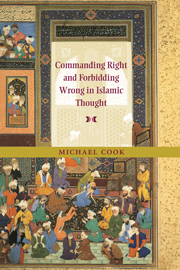Book contents
- Frontmatter
- Contents
- Preface
- Acknowledgements
- PART I INTRODUCTORY
- PART II THE ḤANBALITES
- PART III THE MU'TAZILITES AND SHĪ'ITES
- PART IV OTHER SECTS AND SCHOOLS
- PART V BEYOND CLASSICAL ISLAM
- 18 MODERN ISLAMIC DEVELOPMENTS
- 19 ORIGINS AND COMPARISONS
- 20 CONCLUSION
- APPENDIX 1 Key Koranic verses and traditions
- APPENDIX 2 Barhebraeus on forbidding wrong
- Bibliography
- Postscript
- Index
20 - CONCLUSION
Published online by Cambridge University Press: 07 December 2009
- Frontmatter
- Contents
- Preface
- Acknowledgements
- PART I INTRODUCTORY
- PART II THE ḤANBALITES
- PART III THE MU'TAZILITES AND SHĪ'ITES
- PART IV OTHER SECTS AND SCHOOLS
- PART V BEYOND CLASSICAL ISLAM
- 18 MODERN ISLAMIC DEVELOPMENTS
- 19 ORIGINS AND COMPARISONS
- 20 CONCLUSION
- APPENDIX 1 Key Koranic verses and traditions
- APPENDIX 2 Barhebraeus on forbidding wrong
- Bibliography
- Postscript
- Index
Summary
INTRODUCTION
One culture which was conspicuously absent from the comparisons made in the previous chapter is our own. This culture may not have much standing sub specie aeternitatis, but here and now it has a certain call upon our attention, if only by virtue of being ours. I shall therefore conclude this book with an attempt to identify some key ways in which the attitudes bound up with forbidding wrong resemble or differ from those of the mainstream of contemporary Western culture.
There is clearly no problem with the intelligibility, and indeed acceptability, of the basic idea of the value in Western culture. A contemporary Muslim writing in Arabic relates an anecdote about a Swede who told off a rich American tourist for speeding on a quiet Swedish country road; he comments that this is an instance of commanding right and forbidding wrong. More than this, almost everything of substance that Muslim scholasticism has to say about the doctrine is intelligible to a Western reader who knows nothing about Islam; and a lot of it makes good sense. To see this, one has only to make the experiment of translating the doctrine of, say, the classical Imāmī scholars into plain English. It might go something like this:
‘If you see someone doing something wrong, you ought to try to get them to stop. You should say something, or i that doesn't work, you should do something. Failing that, well, you can just wishthem to stop. But don'tget too violent – that's for the police.
Information
- Type
- Chapter
- Information
- Commanding Right and Forbidding Wrong in Islamic Thought , pp. 585 - 596Publisher: Cambridge University PressPrint publication year: 2001
